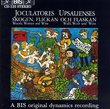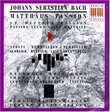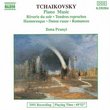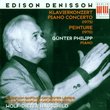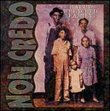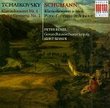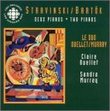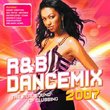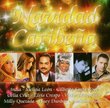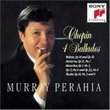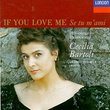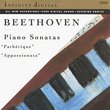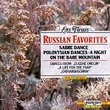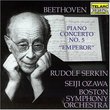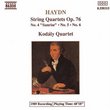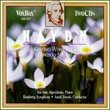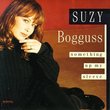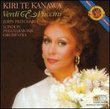| All Artists: Jerry Hadley, Carlisle Floyd, Orchestre de l'Opéra de Lyon, Kent Nagano Title: Floyd: Susannah (complete opera) Members Wishing: 0 Total Copies: 1 Label: Virgin Classics Release Date: 9/13/1994 Genre: Classical Style: Opera & Classical Vocal Number of Discs: 2 SwapaCD Credits: 2 UPCs: 724354503924, 724354503955 |
Search - Jerry Hadley, Carlisle Floyd, Orchestre de l'Opéra de Lyon :: Floyd: Susannah (complete opera)
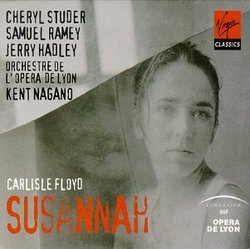 | Jerry Hadley, Carlisle Floyd, Orchestre de l'Opéra de Lyon Floyd: Susannah (complete opera) Genre: Classical
![header=[] body=[This CD is available to be requested as disc only.]](/images/attributes/disc.png?v=a4e11020) ![header=[] body=[This CD is available to be requested with the disc and back insert.]](/images/attributes/disc_back.png?v=a4e11020) ![header=[] body=[This CD is available to be requested with the disc and front insert.]](/images/attributes/disc_front.png?v=a4e11020) ![header=[] body=[This CD is available to be requested with the disc, front and back inserts.]](/images/attributes/disc_front_back.png?v=a4e11020) |
Larger Image |
CD DetailsSimilar CDs
Similarly Requested CDs
|
CD ReviewsA fine example of good American Opera Phil Touchette | Quincy, Illinois United States | 05/17/2002 (5 out of 5 stars) "I was first introduced to Carlisle Floyd's opera "Susannah" in an Opera Workshop class presentation, which led me to obtain a copy of this wonderful 1994 studio recording. Floyd composed the score and libretto to this 1950s folk opera, which is an allusion to the biblical story of Susanna and the Elders-found in the apocryphal books-updated to the backwoods of Tennessee of the early twentieth century. "Susannah" is also seen as an allegory for McCarthyism, in which several actors and politicians were accused of having ties to communism. Only in this story, the accusers are the members of a theocracy, and the accused is the least guilty of all. Overall, "Susannah" is a tale of the dark side of humanity and, ultimately, the loss of innocence.Soprano Cheryl Studer sings the title role of Susannah Polk, a young and lively eighteen-year-old girl. Living on the margins of society with her slightly drunken, though well-meaning older brother Sam (Jerry Hadley), Susannah is the subject of vile gossip from the elders' wives of New Hope Church-led by the vile Mrs. McLean. McLean, along with her husband, paints Susannah to be "evil" and counts on the itinerant preacher Olin Blitch (Sam Ramey) to save her soul at the upcoming revival. The unfounded gossip of the elders' wives is "confirmed" when the church elders-searching for a baptism creek-discover Susannah bathing nude in a stream. Lies and gossip fly as Susannah's name is ruined in the town... What happens further is a tragic story of the loss of innocence and faith in humanity."Susannah" is a heartbreaking and powerful story, which I highly recommend to those interested in opera-particularly American opera. For a twentieth century work, Floyd's score remains rather diatonic, simple, and accessible. It also is one of the few scores to be truly married to the plot, helping to move the action along smoothly. Having lived in the south and having been exposed to revival meetings, religious hypocrisy, and itinerant preachers, Floyd really knew how to use the vernacular of the opera's setting and this is reflected in the score which manages a balance of folk song, protestant hymns, revival meetings, with the heavy emotional scenes between Susannah and her brother, as well as Olin Blitch. A perfect example of this is Susannah's second-act aria "The Trees on the Mountains."Performances on this recording are uniformly solid! Cheryl Studer is a true delight and brings an almost Wagnerian intensity to the young Susannah, especially in the second act when her character has been forced from playful, carefree and spirited girl to a truly changed woman. Her aria "Ain't It a Pretty Night?" shimmers and her second act folk-like aria "The Trees on the Mountains" is simply heartbreaking. Olin Blitch is sung by bass-baritone Sam Ramey, no stranger to this role-he sang Blitch in the lauded 1993 Lyric Opera of Chicago production and will return to the Lyric's revival of "Susannah" this fall. Ramey combines all of the slick, fast-talking, and eventual guilt for a truly human portrayal of this preacher. This is especially seen in his "I'm a lonely man, Susannah." Tenor Jerry Hadley offers an equally strong Sam Polk. Kenn Chester is commendable as the impish and easily swayed Little Bat McLean.The recording itself is lush due to the efforts of conductor Kent Nagano and Orchestre de l'Opera de Lyon and its chorus. There is also a libretto (in English, French, and German) with insightful notes from Jonathan Abarbanel and Carlisle Floyd himself." The Great American Opera wellio@wa.freei.net | Seattle | 10/11/1999 (5 out of 5 stars) "I bought this opera on a whim, knowing nothing about it- and it was one of the greatest discoveries.The score is very beautiful and I believe it to be the most melodic and accessable opera in the English language.I can be put on the same level as Gershwin's 'Porgy and Bess.' It seems very much influenced by Copland.Ramey is in full vocal glory and Studer (whom I don't care for) is in nice voice as well. She has the very beautiful "Ain't it a pretty night?" which is one of my favorite moments.Another wonderful song is "Don't go to bed right yet, Sam" just love it...very folky sounding but stunning in the same.The whole score is wonderful...and in a trend of "modern-20th century" operas that offer no "melody" and sound more like sung dialogue, this is a refreshing and beautiful piece.Highly recommended." Stirring, tuneful, and dark Bass Barreltone | Phoenix, AZ United States | 12/10/2001 (5 out of 5 stars) "So far, there have not been many reviews of this CD set, and it's easy to understand why. This opera doesn't fit easily into any one pigeonhole. People that hear this recording know they love it, but it's difficult to articulate specifically why without going into great detail. The opera itself conveys a wonderful, refreshing sense of simplicity-simplicity too easily destroyed by reviews and analysis, like a literary criticism of Goodnight Moon. This opera is simply too beautiful to question and take apart. Another baffling thing about this opera is its refusal, thus far, to become dated. Some who listen might be tempted to think of this as a new opera, but it is, in fact, fast approaching its fiftieth birthday as of this writing. Perhaps this is due to the universal nature of Susannah's experience, and her utterly human reaction to persecution. Though Floyd may have intended his work to stand as a protest of McCarthyism, its relevance to - indeed, its seeming prescience of -- such recent issues as the shootings at Columbine High School is almost frightening. Also, the opera contains melodies. Real ones. It's pretty much impossible to listen to it without later whistling the square-dance tune. A great deal of the successes and failures of this recording fall on the shoulders of Cheryl Studer, and rightly so. Rumor has it that this recording was originally to feature Renee Fleming in the title role, and one can only wonder what she might have done with it. What Ms. Studer lacks in girlishness, vocally, she certainly makes up in technique. Since opera so often stretches our suspension of disbelief, I can grudgingly accept a Wagnerian soprano in the part of a teenage girl. Why not, when her "Ain't it a pretty night" and "The trees on the mountains" arias are so well-sung? Samuel Ramey also has a magnificent voice, but he sounds a bit confined, a bit too 'bel canto'. He is the only singer in this recording that I wish I could watch on the stage rather than just listen to; I feel I'm missing half his performance by not being able to see him act, especially knowing what a wonderful actor he is.The most difficult thing to pull off convincingly in this opera is, without question, the dialect. Since I happen to be from middle Tennessee myself, I'll tell y'all: these folks are good singers, but they sure ain't Southern. Very, very close, yes, but not quite authentic. Them folks up in the Smokies do have a real strong drawl, yep, but t'ain't quite's bad as this're recordin'd have ya thinkin'. Our diphthongs are well-nigh unsingable, and I give these singers credit for trying, but I wish they had erred a little more on the side of caution. Mrs. McLean and Mrs. Gleaton are often downright wrong in their diction, and Mr. Gleaton actually manages to sound British! Sam Ramey and Kenn Chester are the two that sound the best to me.Mr. Nagano's excellent sense of timing pays off perfectly in the church scene. Over the course of only 11 minutes, we experience a congregation's transformation from idyllic and happy worshippers to angry mob. The horror of this transformation rings completely true-a difficult thing to pull off. Susannah's aria, which follows, stands alone as a spine-tingling ballad; its effect in context is to show the depth of Susannah's pain, and the trauma she is experiencing. From this point on, the opera snowballs to its horrifying, but utterly believable, conclusion.This is an excellent first opera; I play this one for first-timers, and no one has ever told me they found it boring, a waste of time, or anything less than fascinating."
|

 Track Listings (10) - Disc #1
Track Listings (10) - Disc #1